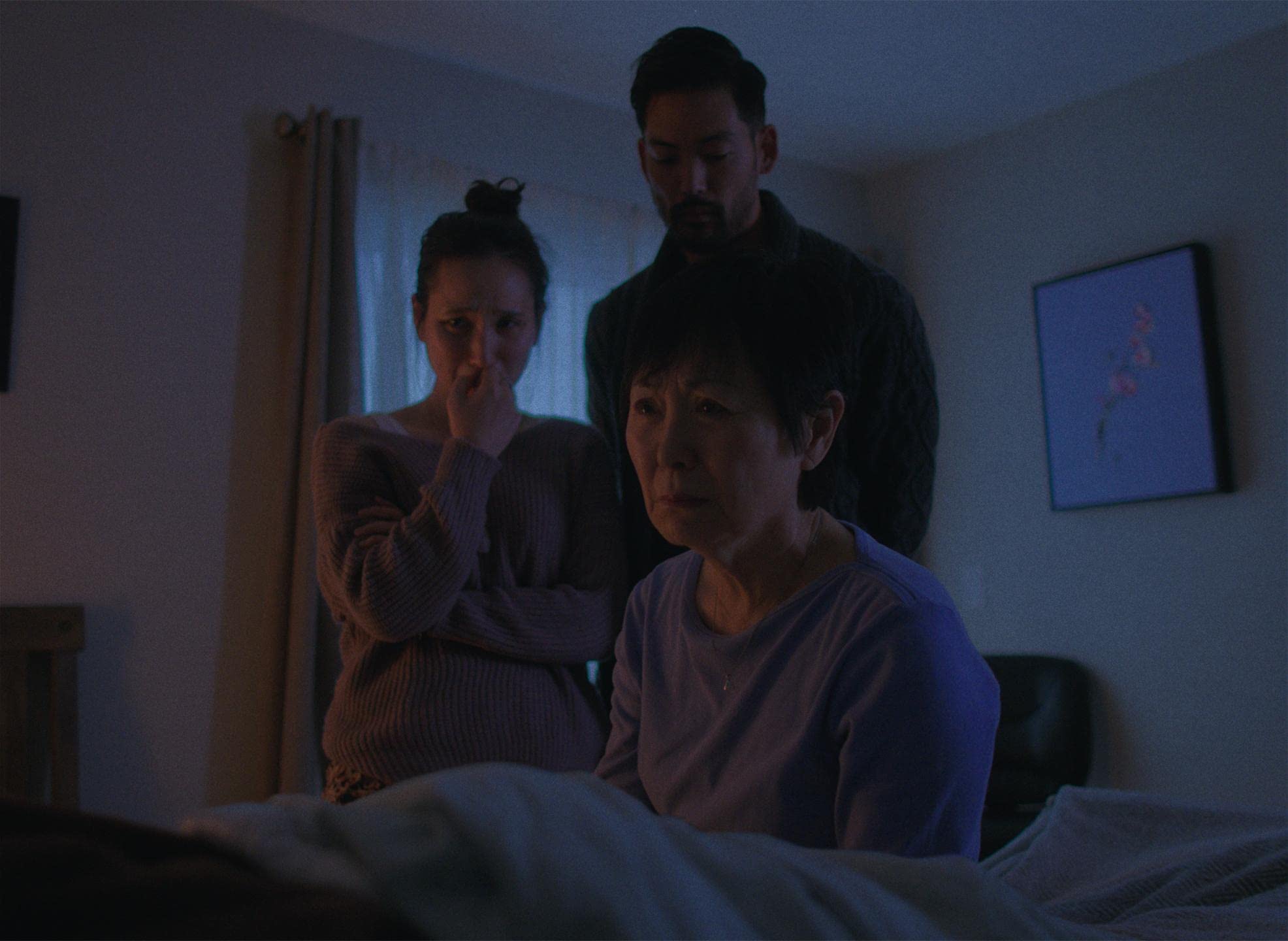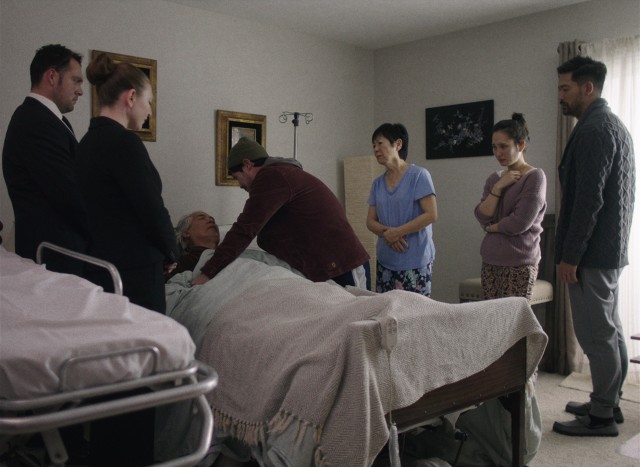Julian Doan’s short drama Raspberry gets right to it: within the first minute, we see the last breath of a dying father, surrounded by his grieving family. An event so world-shattering for those afflicted by it, its enormity can only be captured in the low-key despair of those left behind. As we witness this devastating scene through a pair of close-up shots, it is only when we change to a wider shot that we realize that there is one more person in the room. Sitting in a chair by the doorway, watching from a distance, the youngest son is dealing with the situation in his own way, feeling like an outsider within his own family.
Raspberry stars Raymond Lee (NBC’s Quantum Leap) in the role of the reluctant son, who has come to terms with his father’s passing and his own part in the process. Standing in stark contrast to his seemingly more mature and caring siblings, played by Joseph Lee and Alyssa Kim (who can both be seen in Netflix’s new show Beef), considering the film’s restricted narrative, it is difficult to meaningfully discuss what comes next without some kind of SPOILER ALERT. I’ll try not give too much away, but if you haven’t already watched the film, it would be wise to do so before reading on.
“We shot the film in one day at my dad’s house, in the actual bedroom he died in”
Raspberry is the kind of short film that underlines the medium’s power and advantages in focusing in on a single idea and executing it to maximum effect. Through Julian Doan’s keen directorial sensibilities and the nuanced performances from the entire cast, the short manages to achieve a remarkable emotionality and ground the film in the necessary realism within its minimalistic, yet poignant, depiction of a very narrow timeframe and limited setting. It helps that the mise-en-scène creates a cinematic language that reflects the inherently surreal nature of a family member’s passing in its down-to-earth naturalism, seething with the potential for awkward tensions.
To achieve this, the filmmakers were very deliberate in setting formalistic constrains for themselves. “We shot the film in one day at my dad’s house, in the actual bedroom he died in,” Julian Doan explains as we discuss his production. “We wanted to work under a lot of creative restrictions to set the tone. We didn’t move the camera at all, except once to feel the son’s journey over to his father. To create a sense of isolation, we only shot singles for the son and the father, shooting the rest of the family in group shots.” It’s technical decisions like these, which maybe aren’t immediately obvious, that contribute greatly to the atmosphere we feel as an audience.

“It was about finding a way to recreate the mundane nature of dying” – Doan elaborates on the aims for his short
It is one of the most difficult tasks in storytelling to find the delicate balance between drama and comedy, and it is even rarer to create something that makes you laugh, while tears of sadness still fill your eyes from the moment before. Stories like this feel unapologetically honest and the combination of humor and pathos often comes from a very particular place in the artist’s own life and the way they deal with what happens around them.
In making Raspberry, writer/director Julian Doan’s shared with S/W that, “The film was inspired by my own experiences with my family as we watched my dad pass away in real time, literally watching as he took his last few breaths. I was struck by how casually it all went down… one moment he’s breathing, the next he’s not. There’s no angels singing, no swelling music; completely uneventful. The last breath was so indistinguishable from the rest we weren’t even sure he had died”.
I’ve written before on this site about my own father’s passing, when I was in my late twenties, so it is obvious that films like Raspberry always connect with me in a very special way. But there’s something I’ve barely mentioned before, even to people close to me in my personal life. When my dad was on his deathbed, I wasn’t able to hug him goodbye. As far as I can remember, since childhood, expressing affection of any kind wasn’t really a thing in our relationship. So even though I knew my father was dying, I couldn’t bring myself to show how much he meant to me. It would have felt insincere, inauthentic – even weird and uncomfortable – given how we interacted for the majority of our relationship. I remember that I held his hand when I sensed he was in pain or felt disoriented, but that was it. Maybe I laid my hand on his chest at the very end.
All of this goes a long way to say that everyone, and every family as a microcosm, has their own ways of showing affection and dealing with grief. No ritual or gesture is too absurd, or subdued, if it reflects the true relationship we have had with our loved ones. This is why Raspberry never feels like it builds up to some kind of unearned punchline. The characters share an immensely intimate gesture that is so specific that it speaks volumes about the various ways we say goodbye to someone we love. As the director remarks himself, the final interaction “became a brilliantly simple realization of the close relationship between sorrow and laughter, and perfectly illustrated all the myriad things I think we experience with death.”

“I’m so grateful to all the people who poured their talent and sensibilities into this film. They helped realize the vision in my head and then elevated it far beyond that” – says Doan
Without trying to make this review too much of an inside baseball account, it is worth mentioning that it sometimes takes a while between us accepting a submission and its eventual online release on Short of the Week (our new platform Shortverse tries to bridge that gap with its preview option). In the case of Raspberry, we accepted the film at the end of 2020, before it even world-premiered at Sundance 2021 and went on to play a bunch of other festivals. Afterwards, exclusive international rights were picked up by Showtime’s “Spotlights” short film series for a certain timeframe and so the online release was delayed. Three years after that initial acceptance, the time has finally come to share the film with you and our excitement for it hasn’t diminished.
In the time since premiering Raspberry, Doan says that with the “unexpected success of this film and the work the crew put into it” he felt the need to “pay it forward” and so has gone on to edit three short films, producing one of them. In what I think is a particularly inspiring sentiment, he adds that he believes “the most rewarding thing the past year has been seeing all my friends get their short films off the ground. It’s really inspiring.”
“This is going to bust the door open for us”
Now currently developing what he describes as “the spiritual ‘feature version‘ of Raspberry, entitled Half Sweet, the longer film will be about a Vietnamese-American family who coerces their dying father into hospice care, only to find out the dying process is more than they bargained for. Doan is also currently an assistant editor on what he describes as his “literal dream project,” the HBO/A24 series The Sympathizer, with director/showrunner Park Chan-Wook and starring Robert Downey Jr and Sandra Oh. Speaking about his involvement, the director reveals that he’s “long wanted to be part of a Vietnamese-American film/TV explosion and this is going to bust the door open for us.“

 Georg Csarmann
Georg Csarmann